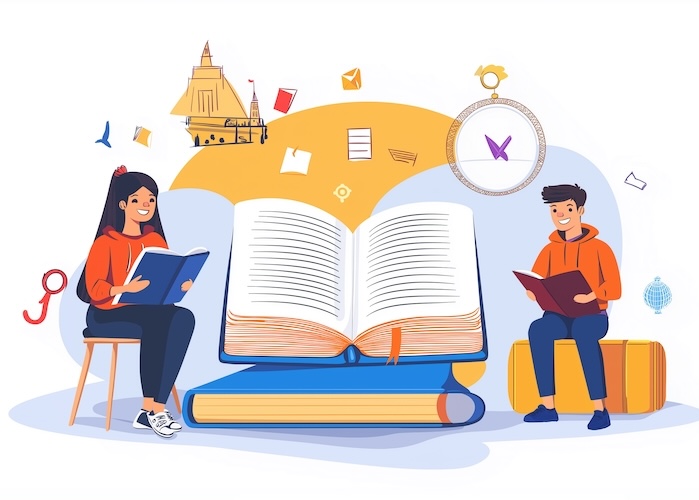
Past Simple
The past simple tense is used to describe actions, events, or situations that were completed at a specific point in the past. It is commonly used to tell stories, recount past experiences, or talk about past habits or routines.
Table of Contents
1.Structures
1.1to be - Forms
These are the past simple forms of the verb to be
| singular | plural | |
|---|---|---|
| 1st person | I was | We were |
| 2nd person | You were | You were |
| 3d person | He/She/It was | They were |
 Practice Examples
Practice Examples
I (be) _____ very happy with the results.
You (be) _____ late for the meeting.
I (be) _____ tired after the long walk.
1.2to be - Structures
S = Subject
QW = question word
| Structure | Examples | |
|---|---|---|
| + | S + was / were + ... | Last year I was always at home on Sundays. |
| - | S + was / were + not +... | He was not/wasn’t at work the day before yesterday. |
| ? | (QW)+ was / were + S +...? | Where were you last Monday? Were you at the railway station at 5 p.m.? |
 Practice Examples
Practice Examples
She was late for school last Monday.
I was at the park yesterday afternoon.
They were at the concert last night.
1.3Other Verbs - Regular
S = Subject
didn’t = did not
QW = question word
| Structure | Examples | |
|---|---|---|
| + | S + Verb(+ed / d) + ... | I liked dancing when I was at school. |
| - | S + didn’t + Verb +... | We didn’t like fast food back then. |
| ? | (QW) + did/didn't + S + Verb +...? | Where did you buy food last week? Did you often buy food last month? |
 Practice Examples
Practice Examples
You played the piano.
I watched the sunset.
They arrived late.
1.4Rules for Adding -ed to Regular Verbs
| Rule | Examples |
|---|---|
| verbs ending in -e → add -d only | live → lived, like → liked |
| verbs ending in a consonant (except e) and a single vowel→ double the final consonant and add -ed. | stop → stopped, plan → planned |
| verbs ending in a consonant + -y → change the y into i before adding -ed. | carry → carried, try → tried |
1.5Other Verbs - Irregular
S = Subject
didn’t = did not
QW = question word
(II) = the past simple form of the main verb → Irregular Verbs List (2nd column)
| Structure | Examples | |
|---|---|---|
| + | S + Verb (II) + ... | I saw you at the theatre last week. |
| - | S + didn’t + Verb +... | I didn’t see you at the theatre last week. |
| ? | (QW) + did/didn't + S + Verb +...? | Where did you see me last week? Did you see me at the theatre last week? |
 Practice Examples
Practice Examples
She gave me a gift for my birthday.
She showed me the picture.
We did our homework.
2.Use
2.1Past Habits
The simple past tense is used to talk about habits or routines that were repeated regularly in the past. In most cases, adverbs like always, often, seldom etc are also used to emphasize that the actions were habitual.
| Example |
|---|
| When I was a child, I always walked to school with my friends. |
| Every Christmas, we decorated the house with lights and baked cookies together. |
| When I lived in Europe, I traveled to different countries almost every summer. |
 Practice Examples
Practice Examples
I (stay) _____ up late watching TV when I (be) _____ in high school.
He (ride) _____ his bike to work when he (live) _____ in the city.
They never (go) _____ on vacation during the winter holidays when I (be) _____ a kid.
2.2Actions Completed in the Past at a Definite Time / Finished Periods of Time
| Rule | Example |
|---|---|
| a past action when the time is given | I met him yesterday. His uncle died in 1895. |
| when the time is asked about | When did you meet him? When was he born? |
| an action whose time is not given but which occupied an already finished period of time | He worked in that bank for four years.(but he does not work there now). She lived in Rome for a long time. (but she is not living there now). |
 Practice Examples
Practice Examples
She (clean) _____ the house last Thursday.
I (live) _____ in Paris for 2 years.(I'm not in Paris any more).
I (visit) _____ my grandmother last weekend.
2.3Chain of Events
Chain of events one following another → the simple past is common in stories and descriptions of past events.
| Example |
|---|
| Last summer, I went to the beach with my family. We packed our bags and drove to the coast. Once we arrived, we set up our towels and umbrellas. |
| I woke up at 7 a.m. and got ready for school. I took the bus and arrived at school just in time for the first class. |
| I opened the door and saw him. |
 Practice Examples
Practice Examples
They (stay) _____ at the hotel, (visit) _____ the nearby attractions, and (shop) _____ for souvenirs.
I (buy) _____ groceries, (go) _____ home, and (cook) _____ dinner.
She (finish) _____ her homework, (watch) _____ a movie, and (go) _____ to bed.
Ready to Practice This Topic?
Join thousands of learners who are improving their English grammar skills every day with GrammarTrack.

